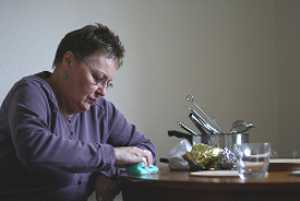How to Stop Obsessive Cleaning
6 steps to stop obsessive cleaning controlling your life
 "Cleaning Table" courtesy of Phoemail
"Cleaning Table" courtesy of PhoemailA woman joked to me once that she wished her husband could develop an addictive fascination with tidying! Could I, she wondered, help implant a "mania for cleanliness" in her husband using the dark arts of hypnosis?
She was (half) kidding but, of course, she'd hate it if her husband really became obsessed with cleaning. No, really, she would. Here's a case in point of how obsessive cleaning ruins lives:
Prefer to watch instead?
Shirley was held captive by her obsession
Shirley came to see me around a year ago.
"I scrub, clean, polish, rinse, vacuum, shine, dust, and scrape! Then I start all over again. My whole life revolves around keeping our house clean." She had the haunted, exhausted, dark patches under the eye look common to all people suffering obsession.
I became painfully aware of a little dust in my office, books left on a desk, an unwashed coffee mug.
She read my mind: "I don't judge other people. I don't mind other people's houses not being pristine. In a way, I like it. It's just that I've always been obsessed with cleaning my house."
I relaxed. "This therapy is working; I feel better already," I thought.
It's great to be clean, tidy, organized, and proud of your environment. But anything taken to extremes starts to backlash and destroy peace of mind, relationships, and health. There should be balance in all things.
How does obsessive cleaning impact lives?
The causes and consequences of obsessive cleaning
Why might someone clean obsessively? Shirley told me that she'd been "brought up to believe" that cleanliness was next to Godliness. (Don't you love it when people say this? Why don't they just say "brainwashed"? Only kidding!). As opposed to, say, being charitable or honest, which I've always felt were better contenders for God proximity. Her parents instilled in her the idea that "good" people, "successful" people keep a clean home.
I became achingly aware of my office again.
"Let's not talk, for a moment, about what you think," I said. "Let's talk about what you feel. Do you feel, say, that a 'successful marriage' can be measured by the cleanliness, the tidiness of a home?"
Now, this wasn't some glib piece of off-the-shelf psychobabble theory. I'd already noticed how she looked fleetingly despairing every time she mentioned her husband (they had no children).
She wavered, looked a little upset. "With me, it's not a fear of germs, contamination. It's more a feeling of needing to do something to make things work..."
The good news? Shirley started to change her life. She brought balance - even love - back into her existence and started to feel spontaneous, released from her self-imposed pristine prison. How did we form an escape plan? What steps did we take to help her live freely?
If you clean obsessively, here's a blueprint of what helped Shirley (and others) overcome it.
Step 1: Stop the obsessive cleaning in its tracks by relaxing first
Any form of Obsessive Compulsive Disorder (OCD) thrives on stress and anxiety. The activity is carried out as an unconscious attempt at assuaging stress. Perhaps there's a superstitious sense that "if only I can clean enough, I can avert disaster or make things better!"
And sometimes the cleaning itself may serve the purpose of exhausting the person into a state of much-longed-for peace of mind and body. But there are easier ways to relax.
Shirley recounted how she'd spend the whole day cleaning their two-bedroom home whilst her husband was at work. Eight hours of furiously cleaning an already spotless house. Finishing, then starting over, again and again; seeking a perfection that was never found.
During our first session together, I told her on no account must she clean any less yet; but I did teach her to relax. She told me she couldn't recall the last time she'd felt so rested. I gave her a hypnosis download to listen to and told her to do this before she started cleaning in the morning. And you know what?
It got her feeling so relaxed at the start of the day, she found herself feeling less like frantically cleaning. She still cleaned, but the intensity and need to do it had been discharged, to some extent, through relaxing first.
So relax before you clean.
Step 2: Break up the obsessive routine
Withdrawing from obsessive cleaning needs to be done in a way not completely dissimilar to withdrawing from a drug habit: bit by bit. Stopping cold can feel too overwhelming (and, after all, some cleaning is desirable!). Shirley was breaking her obsessive pattern by relaxing deeply before she got going on it.
Next I suggested that she start cleaning twenty minutes later than usual. Then the order in which she cleaned changed. I even suggested hypnotically that sometimes she'd forget to clean something altogether, remember later, and then decide just to leave it for the next day. She felt an almost delicious thrill of naughty delight when she later described this.
So very gradually, we just started to play around with the old pattern. Playing around in the way you might play with a tight knot until you find it loosening, gaining slack.
Think about how you can just get a little more creative with your cleaning habit. Changing the order or the time you do it, gently starting to loosen its grip.
Step 3: Look at your wider life
Obsessive cleaning may be symptomatic of wider anxieties. Once these anxieties are 'put to bed', the obsessive cleaning may diminish through lack of 'fuel'.
Shirley described a marriage as devoid of life or warmth as an icy tundra. Her husband, it seemed, didn't want to talk to her or even appreciate her in any way. He'd constantly criticize her. She, in turn, found herself wanting to please and appease him, constantly treading on perfectly polished eggshells.
We worked on helping Shirley improve her assertiveness and speak to her husband more openly about what she needed from him. As a result, she felt less inclined to clean compulsively. He began to talk to her, to suggest they go out - things started to move in a direction that would meet her (and his) real life needs.
Step 4: Do you have a fear of contamination?
Sometimes obsessive cleaning is carried out as an attempt at assuaging fear of contamination, but the feeling is that no matter how much you vacuum, polish, and scrub, there is still 'dirt' somewhere, even if you can't see it - the invisible, all-pervading 'enemy'.
I don't want to be too symbolic (and 'psycho-babbleish') about it, but we could view Shirley as desperately trying to scrub clean a marriage that wasn't working. The trouble was, because she was trying to mend something by focusing in the wrong place, nothing could ever be clean enough.
If you feel obsessive cleaning is wholly or partly maintained through a fear of contamination, it might be a great idea to seek help from a solution-focused therapist skilled in the use of therapeutic hypnosis who'll help you overcome this fixation.
Step 5: Focus on what you are really afraid of
What really drives you to clean obsessively? Sure, it might be a fear of contamination, a sense of wanting to make an 'impossibly perfect home'. But let's go a little deeper.
Think for a moment; now strongly imagine (close your eyes if it helps) not cleaning. Perhaps even just for a day. Seriously think about the reality of not cleaning.
What does it feel like? If it makes you feel a little anxious, then anxiety is driving the obsessive cleaning. When the anxiety diminishes, you take back the reins and begin to dictate when and where you clean. Once you feel calm with the thought of not cleaning so much, you've taken many steps along the road to recovery.
Really get into the habit of focusing deep within your mind on not cleaning and feeling relaxed about that.
Of course you need to clean a bit, but you also need a life. By starting to relax with not always cleaning, you'll relinquish time in which to build opportunity for real satisfactions...
Step 6: Get yourself a life
Shirley started to clean less, bit by bit clawing back her life, slowly at first, then finding herself starting to use the freed up time constructively until it felt natural to clean five times a week, then three times, and then just once.
Her husband was unsettled; the system was changing. But he coped. As I said, he made efforts to build up a life with his wife. They started doing things together. She needed other stuff to do. She did a course, got a job, and met new friends.
She still took pride in her house, but as she told me, "I have a life now, not just a cleaning schedule. If there's a sock lying around or the carpet needs vacuuming, it can wait until I've finished doing something more interesting. And who wants people to have nothing more to say at their funeral than: 'She kept a wonderful home; she polished well!'"
Getting over compulsive cleaning doesn't happen overnight (although it can do, on occasion). But when you find the doorway out of the compulsion (which is closer than you think), you'll always be pleased you did.






